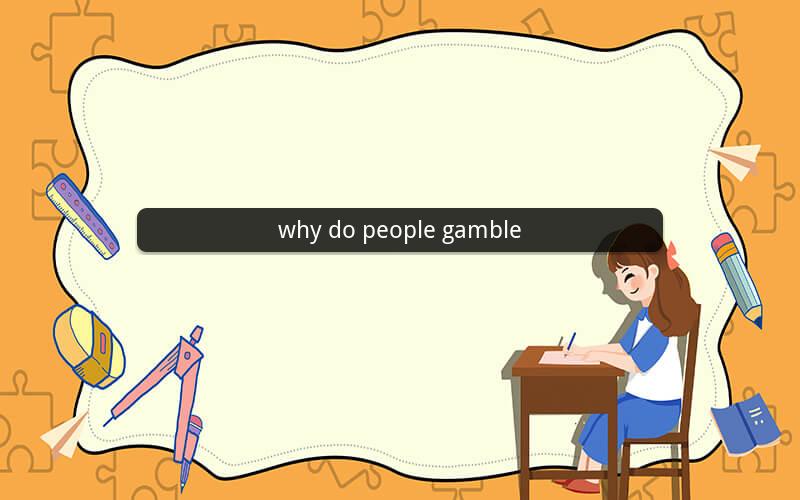
Why Do People Gamble?
Table of Contents
1. Introduction to Gambling
2. The Psychology of Gamblers
3. Social and Cultural Influences
4. Economic Factors
5. The Role of Technology
6. The Impact of Advertising
7. The Search for Thrill and Escape
8. The Concept of Risk and Reward
9. Case Studies and Personal Testimonies
10. Conclusion
1. Introduction to Gambling
Gambling has been a part of human culture for centuries, taking various forms and evolving with time. From ancient dice games to modern online casinos, the allure of gambling remains a topic of great interest. But why do people gamble? This article delves into the reasons behind this widespread phenomenon.
2. The Psychology of Gamblers
The psychological aspects of gambling are complex and multifaceted. Many individuals are driven by the thrill of taking risks, the anticipation of winning big, or the desire to feel a sense of control. Some gamblers may experience an adrenaline rush that they find addictive, while others seek to escape from real-life problems or stress.
3. Social and Cultural Influences
Social and cultural factors also play a significant role in why people gamble. In some cultures, gambling is seen as a form of entertainment or a way to bring people together. Social gatherings, holidays, and special occasions often involve gambling activities, making it a social norm for some.
4. Economic Factors
Economic pressures and the pursuit of wealth can be strong motivators for gambling. The promise of financial gain can be enticing, especially for those facing financial difficulties or aspiring to improve their standard of living. However, this desire for wealth can often lead to problem gambling and financial ruin.
5. The Role of Technology
The advent of technology has revolutionized the gambling industry, making it more accessible and convenient than ever. Online casinos, mobile apps, and virtual reality gambling platforms have expanded the reach of gambling, attracting a wider audience. The ease of access to gambling opportunities has made it easier for people to engage in risky behavior.
6. The Impact of Advertising
Advertising plays a crucial role in promoting gambling. The portrayal of glamorous lifestyles, the allure of quick wealth, and the excitement of gambling activities are all designed to entice potential customers. While advertising can be responsible for promoting responsible gambling, it can also lead to excessive gambling behavior.
7. The Search for Thrill and Escape
For some individuals, gambling is a means to seek excitement and escape from the monotony of daily life. The thrill of the unknown, the suspense of anticipation, and the possibility of winning can provide a temporary escape from reality. However, this pursuit of excitement can often lead to compulsive gambling and negative consequences.
8. The Concept of Risk and Reward
The concept of risk and reward is a fundamental aspect of gambling. The allure of potentially high rewards makes taking risks seem worthwhile. However, the reality is that the odds are often stacked against the gambler, and the chance of winning big is slim. This discrepancy between risk and reward can lead to problematic gambling behavior.
9. Case Studies and Personal Testimonies
Numerous case studies and personal testimonies have highlighted the various reasons why people gamble. These stories often reveal the complex interplay between psychological, social, and economic factors. From individuals struggling with addiction to those who have won significant sums of money, these narratives provide valuable insights into the world of gambling.
10. Conclusion
The reasons why people gamble are diverse and multifaceted. From the psychological appeal of risk and reward to the social and cultural influences, there are numerous factors at play. Understanding these reasons can help in developing strategies for responsible gambling and addressing the issues surrounding problem gambling.
Questions and Answers
1. What are the psychological factors that contribute to gambling addiction?
- Psychological factors such as the need for excitement, the anticipation of a thrill, and the desire to escape from reality can contribute to gambling addiction.
2. How do social and cultural factors influence gambling behavior?
- Social and cultural factors, including the normalization of gambling, social gatherings, and cultural traditions, can influence gambling behavior.
3. What economic factors can lead to problem gambling?
- Economic pressures, financial difficulties, and the pursuit of wealth can lead to problem gambling.
4. How has technology impacted the gambling industry?
- Technology has made gambling more accessible, convenient, and widespread, leading to an increase in problem gambling cases.
5. What role does advertising play in promoting gambling?
- Advertising can promote gambling by portraying glamorous lifestyles, the allure of quick wealth, and the excitement of gambling activities.
6. Why do some individuals seek thrill and escape through gambling?
- Some individuals seek thrill and escape through gambling as a way to cope with stress, boredom, or to experience a temporary escape from reality.
7. How does the concept of risk and reward influence gambling behavior?
- The concept of risk and reward influences gambling behavior by enticing individuals to take risks for the potential of high rewards, often with slim chances of success.
8. What are some common reasons for problem gambling in personal testimonies?
- Personal testimonies often reveal reasons such as financial difficulties, the pursuit of wealth, the desire for excitement, and the need to escape from reality.
9. How can understanding the reasons behind gambling help in addressing problem gambling?
- Understanding the reasons behind gambling can help in developing tailored interventions and support systems to address problem gambling.
10. What are some effective strategies for responsible gambling?
- Effective strategies for responsible gambling include setting limits, understanding the odds, avoiding gambling when under stress, and seeking help if needed.